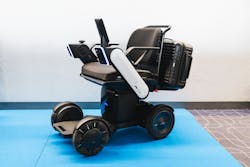WHILL Expands Airport Trials of Self-Driving Personal Mobility Devices to North America
SAN FRANCISCO – November 20, 2019 – WHILL – makers of the cutting-edge Model Ci and Model A Intelligent Personal Electric Vehicles (EVs), today announced the trials of its autonomous driving Personal EVs at Dallas/Fort Worth International Airport (DFW) and Winnipeg Richardson International Airport (YWG) as an initiative to further the current mobility-as-a-service (MaaS) model worldwide.
This will be the second wave of WHILL autonomous trials, which appeared in Haneda Airport and Abu Dhabi Airport earlier this year and Amsterdam Airport Schiphol previously. Trials in Dallas took place Nov. 14-15 (both semi and full autonomous), while Winnipeg semi-autonomous trials will take place Dec. 12-13. After arriving at the airport, travelers with restricted mobility will be able to navigate the WHILL airport model through the airport to their gate, and once arrived, hit “return,” allowing the Personal EV to return itself to the original docking station. Full autonomous trials are slightly different from semi-autonomous trials as the WHILL airport model will freely drive itself to the desired destination upon the passenger selecting the required gate on the device, and then back to the original docking station. The WHILL airport model independently detects and avoids obstacles throughout the airport, including other people and objects, with sensors and automatic brakes.
“When traveling, checking in, getting through security and to the gate on time is critical to avoid the hassle and frustration of missing a flight,” said Satoshi Sugie, Founder and CEO of WHILL. “Travelers with reduced mobility usually have to wait longer times for an employee to bring them a wheelchair and be pushed to their gate, reducing their flexibility while traveling. We are now providing an opportunity for travelers with reduced mobility to have a sense of independence as they move about the airport and get from point A to point B as smoothly as possible. Our trials have proven to be successful in other countries and we’re excited to bring this initiative to North America for the first time.”
While long distance travel has been rapidly evolving and becoming more convenient for decades, limited innovation has been developed around moving shorter distances, especially for people with reduced mobility. The new MaaS model combines WHILL’s sleek and intuitive Personal EVs, which can easily maneuver indoors and effortlessly tackle rugged terrains, with Scootaround – a leading personal transportation solutions company, worldwide rental, repair and mobility management services. The shared vision of improving MaaS worldwide is fueling the development of new products and initiatives, such as the autonomous trials in airports, to meet changing market needs for assistive device use.
“We are committed to delivering an exceptional customer experience for every traveler through our airport, regardless of their level of mobility,” said Barry Rempel, President and CEO of Winnipeg Airports Authority. “Accessibility is a priority for Winnipeg Richardson International Airport and travel is now easier for passengers with limited mobility thanks to our partnership with WHILL. We are excited to be one of the first airports in North America to trial WHILL’s autonomous personal mobility devices with our travelers.”
As WHILL and Scootaround continue to implement their shared MaaS model, their combined goal is to have WHILL’s Personal EVs in airports across the world along with Scootaround’s services to ensure an efficient travel experience. All travelers deserve a smooth travel experience and providing autonomous devices to help maneuver through airports opens that experience to all.
